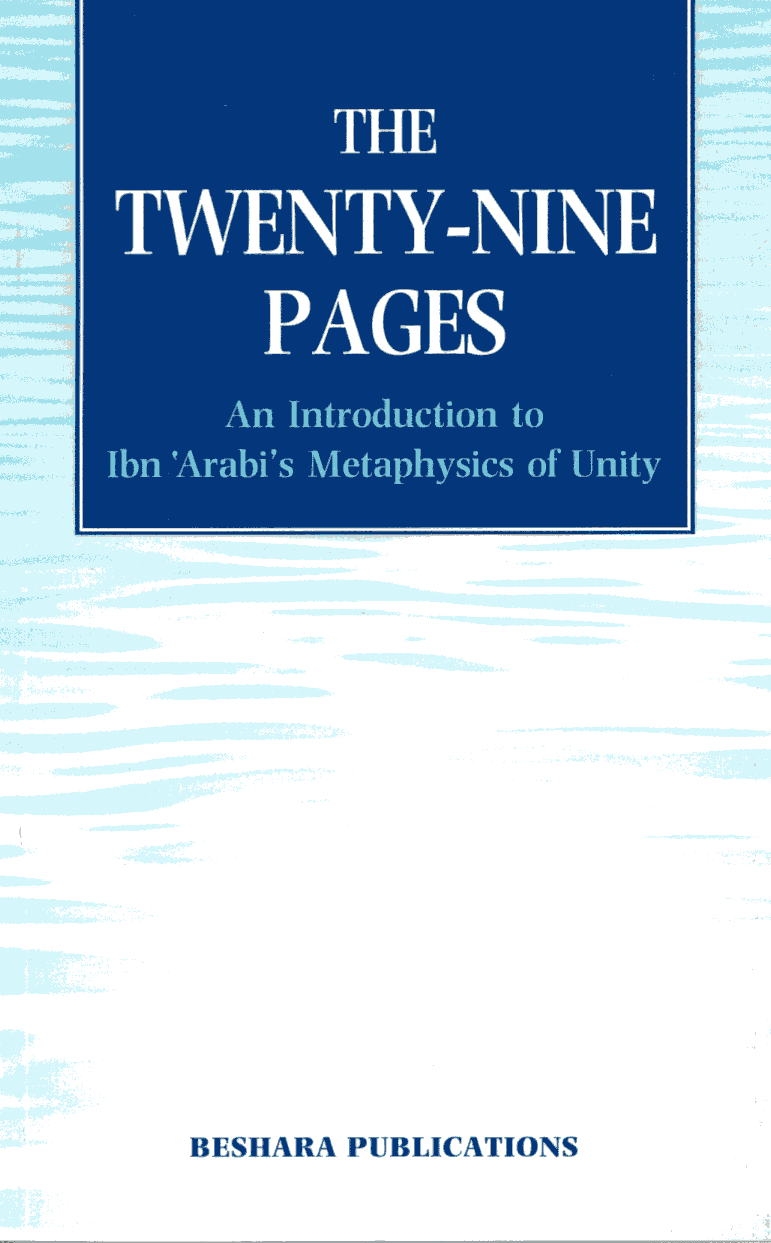BOOKS BY BESHARA PUBLICATIONS
The Twenty-Nine Pages
An Introduction to ‘Ibn ‘Arabi’s Metaphysics of Unity
£ 7.50 (+P&P)
Paperback, 80 pages
How to Order
Worldwide
Please order with Beshara Publications [/]
email: info@besharapublications.org.uk
Credit/debit card: on receipt of your order a PayPal invoice will be sent by email. A Paypal account is not required.
Cheque: can only be accepted in GBP from UK bank accounts. Post to: Beshara Publications, PO Box 33, Northleach, Cheltenham GL54 3WU, UK
Postage will be added to your order.
How to Order
How to Order
Worldwide (except North America)
Please order with Beshara Publications [/]
email: info@besharapublications.org.uk
Credit/debit card: on receipt of your order a PayPal invoice will be sent by email. A Paypal account is not required.
Cheque: can only be accepted in GBP from UK bank accounts. Post to: Beshara Publications, PO Box 33, Northleach, Cheltenham GL54 3WU, UK
Postage will be added to your order.
.
North America
Please order direct from the Muhyiddin Ibn Arabi Society [/]
Extracts from The Mystical Philosophy of Muhyiddin Ibn ‘Arabi by A.E. Affifi.
Affifi’s work had four main sections. The first was devoted to what Ibn ‘Arabi said about Being and Reality, the second collated what he wrote about insani kamil (the Logos, the perfect human being). The third dealt with knowledge and varieties of mystical knowledge, and the fourth considered aspects of the path of return. The result was a rather formal overview, but one rich in quotations from Ibn ‘Arabi’s writings, and reflecting the breadth of his exposition.
The extracts presented here, as a continuous text, were first put together many years ago by Bulent Rauf, consultant to the Beshara Trust until his death in 1987. His intention was to provide a complete introductory guide to the language and thought of Ibn ‘Arabi, particularly those aspects of his doctrine which refer to the unity of being and the perfectability of man.
Long known simply as the ‘Twenty-Nine Pages’ from the format of its original printing, this text has been a foundation for study at the Chisholme Institute, where it has been read prior to Ibn ‘Arabi’s own more demanding works such as the Fusus al-Hikam. The rich content, incisiveness and extraordinary scope of the passages from Ibn ‘Arabi make it an invaluable reference for all students of mysticism and the spiritual life, whatever their background.
Read an Extract from the Book
The One and the Many
According to Ibn ‘Arabi there is only one Reality in existence. This Reality we view from two different angles, now calling it Haqq (the Real) when we regard it as the Essence of all phenomena, and now Khalq (the Immanence), when we regard it as the manifested phenomena of that Essence. Haqq and Khalq, Reality and Appearance, the One and the Many, are only names for two subjective aspects of One Reality: it is a real unity but an empirical diversity. This Reality is God. “If you regard Him through Him”, Ibn ‘Arabi says, “then He regards Himself through Himself, which is the state of unity; but if you regard Him through yourself then the unity vanishes”
The One is everywhere as an Essence, and nowhere as the Universal Essence which is above and beyond all ‘where’ and ‘how’. “Unity has no other meaning than two (or more) things being actually identical, but conceptually distinguishable the one from the other; so in one sense the one is the other; in another it is not.” “Multiplicity is due to different points of view, not to an actual division in the One Essence (‘Ayn).”
The whole of Ibn ‘Arabi’s metaphysics rests on this distinction and there is not a single point in his system where it is not introduced in one form or other.
Owing to our finite minds and our inability to grasp the Whole as a Whole, we regard it as a plurality of beings, ascribing to each one characteristics which distinguish it from the rest. Only a person possessed of the vision of a mystic, Ibn ‘Arabi would say, can transcend, in a supra-mental state of intuition, all the multiplicity of forms and ‘see’ the reality that underlies them. What seem to multiply the One are the ahkam(predications) which we predicate of external objects – the fact that we bring them under categories of colour, size, shape, and temporal and spatial relations, etc. In itself the One is simple and indivisible.
To express it in theological language, as Ibn ‘Arabi sometimes does, the 0ne is al-Haqq (the Real or God), the Many are al-Khalq (created beings, phenomenal world); the One is the Lord, the Many are the servants; the One is a unity (jam’), the many are a diversity (farq) and so on.
Now we are in a position to understand the apparent paradoxes in which Ibn ‘Arabi often revels, such as “the creator is the created”; “I am He and He is I”; “I am He and not He”; Haqq is Khalq and Khalq is Haqq“; “Haqq is not Khalq and Khalq is notHaqq“; and so on and so on. Explained on this relative notion of the two aspects of Reality, these paradoxes are no paradoxes at all. There is a complete reciprocity between the One and the Many as understood by Ibn ‘Arabi, and complete mutual dependence. Like two logical correlatives, neither has any meaning without the other.
© The Beshara Trust (UK) 2022. All rights reserved
